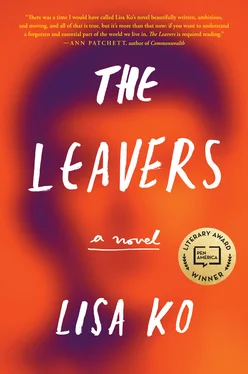Last Saturday, Leon’s hands had pressed down on my hips. His sister, whom he lived with, had taken her own son to visit a friend, so we were alone and could make all the noise as we wanted. He pushed into me with his eyes closed, and as I moved against him they opened. He said my name, I said his, and then everything was spinning and sliding. “Say my name again,” I demanded, and he did and I laughed. This novelty, my hand on a new man’s back. Such a nice, muscled back. Over five years in New York and this was the first time I hadn’t been surrounded by people, just me and one other person in an apartment by ourselves, and afterwards I leaned against the sink in Leon’s bathroom and cried, not only because of the sex and the beautiful man, but because of how good it felt to not hear sewing machines or honking cars or my roommates sniping at one another. Savor this moment, I told myself, you may never get it again.
“Deming,” my cousin said, “you don’t remember your mother?”
“Of course he remembers me. How could he forget?”
Three new roommates watched us across the room. One of them clicked her tongue and said, “He forgot his own mother!”
“He’s tired after such a long flight. It’s not easy to for a child to travel so far.” I reached for you again, but you turned and ran through the kitchen, and I raced after you and scooped you from behind, pressing my face to the back of your neck. You smelled stale, like old sweat, and at last you sagged against me.
My cousin was off to DC, where a dishwashing job awaited him. He didn’t look that strong, with skinny arms and bad posture, so I slipped him some cash, hoped it would help him. He left, and I showed you the bathroom, gave you a toothbrush and a towel, and after you washed up you fell asleep without a word. I sat next to you hugging my knees and recalling your baby shape and squishy legs, all replaced by this much larger child. I didn’t know if Leon would see me again, or if last Saturday would be our first and only time. I tried to concentrate on you, this boy who’d been gone so long he had no memory of my face. Leon liked my face. I should have been thinking about you, only you, but I thought, again, of Leon’s hands, and my resolve to not think of Leon retracted like the electric cord on the vacuum cleaner, whipping into its hiding spot.
In the morning I made soup, alone in the apartment with you, and you glugged your food without talking, looking at the kitchen walls and plastic bags stuffed into plastic bags, the grease-splattered square of tin foil taped over the burners. “Eat more,” I said. “You don’t remember when I used to feed you?” It was a dumb thing to say; I knew you couldn’t remember, and I hated when adults spoke to children like they were idiots.
You shook your head. “Soda?”
“You want soda?”
“Yi Gong gave me soda.”
So that was what he’d done with the money I sent him. “No soda here.”
You crossed your arms, challenging me. The fat on your face jiggled and I could sense the heat coming off your skin.
“Talk to your mama.”
“No.”
“What did you say?”
“ No .”
I’d sewed thousands of shirt hems to bring you here. “Ungrateful brat.”
You got up and walked to the bedroom, pointed to a hump of laundry. “Dirty,” you said.
“Listen to me. I’m your mother and this is your home. You were born here. You should be grateful I took you out of the village.” I shook your shoulders. “Now wash up. We’re going outside.”
You sulked, but went into the bathroom, and soon I heard the water running.
Snow had fallen overnight. Today it was fresh, sparkling in the sun, and you were hushed by the sight. Rutgers Street was bright and crisp, the kind of cold that went right up your nose. But it would soon morph into a muddy slush that melted into sad mounds dotted with dog poo. Around the corner were the hulking buildings that marched down to the river. We crossed over Bowery, making soft tracks. The city had unbuttoned itself and people walked slower, taking their time, and on Canal the cars were cowed by snow. The drivers steered hesitantly around corners, and at stoplights they didn’t race to beat pedestrians. They sprayed slush, drifting, indecisive. I would teach you to love the city like I did.
We passed Elizabeth Street, Mulberry, Mott. Our steps were exaggerated and high, as if the snow had gummed our shoes. At a stall on Canal, I bought you a blue winter coat, haggled for a red hat and let you pick out a pair of boots with fuzzy lining.
Broadway. Sixth Avenue. “Watch.” I took a deep breath and exhaled, creating clouds of frost. You seemed impressed. I took another breath and you took one of your own, blowing in the cold. We descended the stairs to the subway, I swiped my card twice, and when the train arrived you took the seat by the window, bobbing back and forth as you watched the tunnel stretch out, counting off the stops as we rode uptown, one-four, three-four, four-two, five-nine. At 125th Street the train would burst above ground, tearing straight into the sunlight, and I couldn’t wait to see your face.
THE NAIL SALON WHERE Didi worked was hiring. “Don’t sleep on this, Polly, or you’ll be working at that factory until you’re an old lady,” she said. She brought home old bottles of polish and I practiced on our roommates, so when I went to Hello Gorgeous to meet Rocky, the manager, I knew exactly what to do.
I gave Rocky a mani-pedi and got the job. Twenty-five hours a week to start, no pay until the three-month training period ended, though I could keep my tips. Took out a loan to cover rent, food, the black pants and shirts I had to wear, the fees Rocky charged for training, though the training itself consisted of watching my co-workers and cleaning up after them. But it was different from sewing, and there was the promise of more money.
To celebrate, I bought you a set of Legos and helped you construct the plastic pieces into a spaceship, which you held up in the air as you ran around the room. “Crash landing!” you shouted, plunging the spaceship into a pillow. “Boom!”
I rescued the spaceship and waved my arms over it, mimicking the sound of hammers and drills. “They’ve made repairs. It’s ready to fly again.”
“I want a tiger,” you said.
“A tiger?”
Getting to know you was strange. You wanted video games, but I bought you a box of crayons, which you pressed on so hard they broke in two. And now, a tiger. I watched you run around the room, the spaceship swooping and soaring. We had come into a large clearing. It no longer seemed we would never leave this apartment. I wished I could call Yi Ba and tell him.
As you filled out into a new person, so did I, and I tucked the years without you away as another triumph, another thing I’d survived; saved Leon’s voice mails and replayed them on breaks, his messages brief and to-the-point, each word I coaxed out of him a victory or a challenge. Leaving for work soon. Call me tomorrow. I’ll be home by eight. The same went for you. Victory when you ran to join your classmates before school and brought home drawings, when we took the train and I watched you call off the stops. At the playground, you were the first kid in your class to do a flip on the metal bars, the one who made the highest, most daring leaps between benches.
Didi called you Little Piglet, listened when you told the same stories for the five-hundredth time, indulged you in your favorite game, the excruciating one where you’d snatch your hand away whenever I tried to high-five it. “Fooled you!” you’d say. “Watch me again!” If I yawned or looked away, even for a moment, you would screech, “Keep your eyes open, Mama, you have to keep them open!” But Didi could sit with you forever, unflagging in her response each time you took your hand away. “Wow!” she’d cry. “Little Piglet, you sure fooled me. Okay, let’s try again, I’ll high five you — oh, wow, you tricked me again!” As I watched you and her, I would hear Yi Ba saying I was selfish and spoiled. Perhaps there was something wrong with me because I didn’t have an infinite amount of patience for children’s games. Remorse, dormant and persistent, flapped up. I’d abandoned my father; I hadn’t mourned him enough.
Читать дальше











